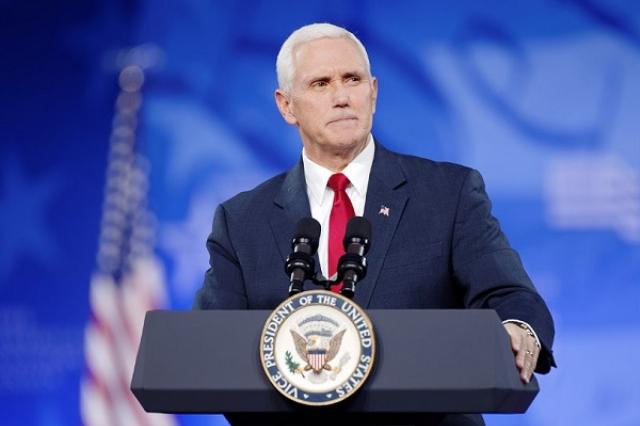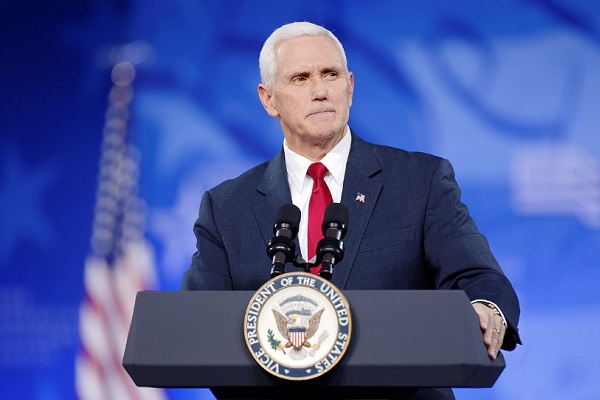

Image: Michael Vadon via Wikimedia Commons, CC BY-SA 4.0.
Michael Vadon
What should we make of the former vice president?In his narrative poem The Divine Comedy, 14th-century Italian sage Dante Alighieri reserved the ninth and deepest circle of his Inferno for those scoundrels who betrayed their comrades and leaders — Brutus, Cassius, Judas Iscariot, Satan himself.
A revised MAGA edition of The Divine Comedy might justifiably find space in that circle for people like Liz Cheney, Gen. Mark Kelly, and the editorial staff of The Bulwark. Although many would put former vice president Mike Pence in there as well, I would not.
I would argue for a lower circle still, a tenth circle. Although Dante did not say, as alleged, “The darkest places of hell are reserved for those who maintain their neutrality in times of moral crisis,” someone did, and it makes sense. After all, one can respect the traitor for taking a stand, however evil. But it is hard to respect those who, in times of moral crisis, sit on their hands.
Dark these hellish places may be, but in Republican circles, they are popular nonetheless. Mitt Romney, Paul Ryan, the Bush family, half the staff of the National Review — they have been there for years. Pence is a late arrival.
Pence’s descent into the political nether world began on January 6, 2021. At noon on that fateful Wednesday, President Donald Trump began his speech on the White House Ellipse. In the speech, Trump pinned his hopes on the actions of Pence.
“States want to revote,” said the president. “The states got defrauded. They were given false information. They voted on it. Now they want to recertify. They want it back. All Vice President Pence has to do is send it back to the states to recertify, and we become president, and you are the happiest people.”
From the crowd’s perspective, Pence was going to be the day’s hero or its goat. Trump made the process seem much simpler than it ever could possibly be, but if he was deceiving anyone, he started by deceiving himself.
“If this happened to the Democrats,” Trump continued, “there’d be hell all over the country going on. There’d be hell all over the country.” About this, he was absolutely right. The left had set up some four hundred protest sites, ready to sabotage a Trump victory. These protests did not portend to be any more peaceful than those that followed the death of George Floyd.
Trump, however, did not expect violence from his supporters. “You’re the real people, you’re the people that built this nation,” he told them. “You’re not the people that tore down our nation.” Trump soon followed with the speech’s most quoted line — most quoted on conservative media, that is — “I know that everyone here will soon be marching over to the Capitol building to peacefully and patriotically make your voices heard.” The House January 6 committee and special prosecutor Jack Smith both edited this line out of their respective documents. The media never played it.
Just before 1:00 p.m., about 15 minutes before Trump had concluded his speech, Mike Pence tweeted out a letter he had failed to clear with the president. In the letter’s opening, Pence would seem to have swallowed what the media uniformly called the “big lie” — namely, any suggestion that the 2020 election was something less than “free and fair.”
Wrote Pence, “After an election with significant allegations of voting irregularities and numerous instances of officials setting aside state election law, I share the concerns of millions of Americans about the integrity of this election.”
Later in the letter, Pence affirmed the right of members of Congress to protest what was clearly a flawed election. “Given the voting irregularities that took place in our November elections and the disregard of state election statutes by some officials,” wrote Pence, “I welcome the efforts of Senate and House members who have stepped forward to use their authority under the law to raise objections and present evidence.”
These, however, were not the words that shaped history. Said Pence for the ages, “It is my considered judgment that my oath to support and defend the Constitution constrains me from claiming unilateral authority to determine which electoral votes should be counted and which should not.”
Pence did not come to this conclusion casually. He must have suspected, however, that had he sent the results back to the states for further adjudication, he might have launched a civil war. What he got instead was a largely peaceful protest that the Democrats shamelessly alchemized into an insurrection.
For the first several months or so after January 6, Pence wandered about in his own limbo. For all the talk of bad blood between them, he and Trump kept in touch. At an April 2021 gathering of pastors, reported the Washington Post, “Pence spoke with an almost reverence about the former president.” He stressed Trump’s accomplishments in office and ignored Trump’s criticisms of his actions on January 6.
If anyone, it was Pence who severed the alliance. To position himself for a presidential run in 2024, he felt he had to. Unwilling to attack Trump’s policies, Pence chose to focus on the president’s comportment on January 6. As the New York Times reported in May 2022, Pence “used high-profile speeches to criticize the former president’s push to overturn the 2020 election results.”
The vice president who on January 6 criticized “significant allegations of voting irregularities and numerous instances of officials setting aside state election law” had moved on. Apparently, Pence no longer shared “the concerns of millions of Americans about the integrity of [the 2020] election.”
In June 2023, Pence launched — how soon we forget — his bid for the Republican nomination. To distance himself from his former boss, Pence now stressed how Trump’s words on January 6 allegedly put him and his family in danger. He also wholeheartedly embraced the Ukrainian cause and warned of isolationism.
Pence’s campaign caught the opposite of fire. By October 2023, it was over. Although out of the race, he announced twice in 2024 that he would not endorse Trump for president. Unlike the Cheneys, he refused to endorse the Democrat candidate of the month. That would have taken gumption.
Despite his seeming neutrality, Pence remains active in down-ticket Republican races and is a frequent contributor on X. His globalist impulses aside, Pence remains a conservative and a Republican. He is not a RINO. His attacks on Kamala Harris are relentless. He retweets posts that praise the “tax cuts and deregulation under the Trump-Pence admin” as well as those that lobby “for the right of children not to have their healthy bodies permanently and harmfully altered as ‘treatment’ for gender dysphoria.”
On October 12, Pence tweeted in his own voice, “Conservatism is bigger than any one election or any one person. It’s about ideas. We intend to preserve those ideas and save the Conservative Movement.” Save it, one wonders, from whom?
Of course, a Harris victory would not only shatter the conservative movement, but could also end democracy as we know it. If there is a “time of moral crisis,” Pence surely realizes, it is now, but he has waited too long. A month ago, had he crawled out of his tent and engaged in battle, it might have mattered. Today, it would only seem self-serving.
Jack Cashill’s Ashli: The Untold Story of the Women of January 6 is now available in all formats.
<img a alt="
Image: Michael Vadon via <a data-cke-saved-href=" by-sa captext="





